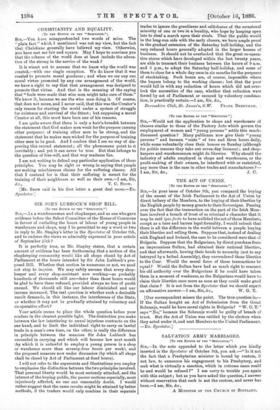SIR JOHN LUBBOCK'S SHOP BILL.
[To THE EDITOR OF THE "SPECTATOR.'l Sis„—As a warehouseman and shopkeeper, and as one who gave evidence before the Select Committee of the House of Commons in favour of curtailing the hours of labour of young people in warehouses and shops, may I be permitted to say a word or two in reply to Mr. Stapley's letter in the Spectator of October 9th, and to endorse the views so admirably expressed in your article of September 25th ?
It is perfectly true, as Mr. Stanley states, that a certain amount of evidence has been forthcoming that a section of the shopkeeping community would like all shops closed by Act of Parliament at the hours intended by Sir John Lubbock's pro- posed Bill. Whether that section be numerous or not, we need not stop to inquire. We may safely assume that every shop- keeper and and every shop-assistant now working—as probably hundreds of thousands still are—later than those hours would be glad to have them reduced, provided always no loss of profit ensued. We should all like our labour diminished and our income increased. The real question is whether such a desirable result demands, in this instance, the interference of the State, or whether it may not be gradually attained by voluntary and co-operative effort Your article seems to place the whole question before your readers in the clearest possible light. The distinction you make between the law interfering-to annul injurious contracts on the one hand, and to limit the individual right to carry on lawful trade in a man's own time, on the other, is really the difference in principle between the measure Sir John Lubbock has succeeded in carrying and which will become law next month (by which it is unlawful to employ a young person in a shop or warehouse more than seventy-four hours per week), and the proposed measure now under discussion (by which all shops shall be closed by Act of Parliament at fixed hours).
I will not refer to the arguments and illustrations you employ to emphasise the distinction between the two principles involved. That personal liberty would be most seriously attacked, and the interest of the buying public, the poorer sections especially, most -injuriously affected, no one can reasonably doubt. I would rather suggest that the same results might be attained by better methods, if the traders would only combine in their separate trades to ignore the greediness and selfishness of the occasional minority of one or two in a locality, who hope by keeping open late to steal a march upon their rivals. That the public would in the long-run side with the early closers, we have ample proof in the gradual extension of the Saturday half-holiday, and the very reduced hours generally adopted in the larger houses of business. It should not be overlooked that the great co-opera- tive stores which have developed within the last twenty years, are able to transact their business between the hours of 9 a.m. and 6 p.m., to adopt the Saturday half-holiday, and some of them to close for a whole day once in six months for the purposes of stocktaking. Such hours are, of course, impossible where the buyers belong to the working classes ; but that the poor would fall in with any redaction of hours which did not over- look the necessities of the case, whether that redaction were forced by act of Parliament or secured by voluntary combina- tion, is practically certain.—I am, Sir, &c., Devonshire Club, St. ,Tamee's, S. W. FRANK DEBENHAM. :


































 Previous page
Previous page